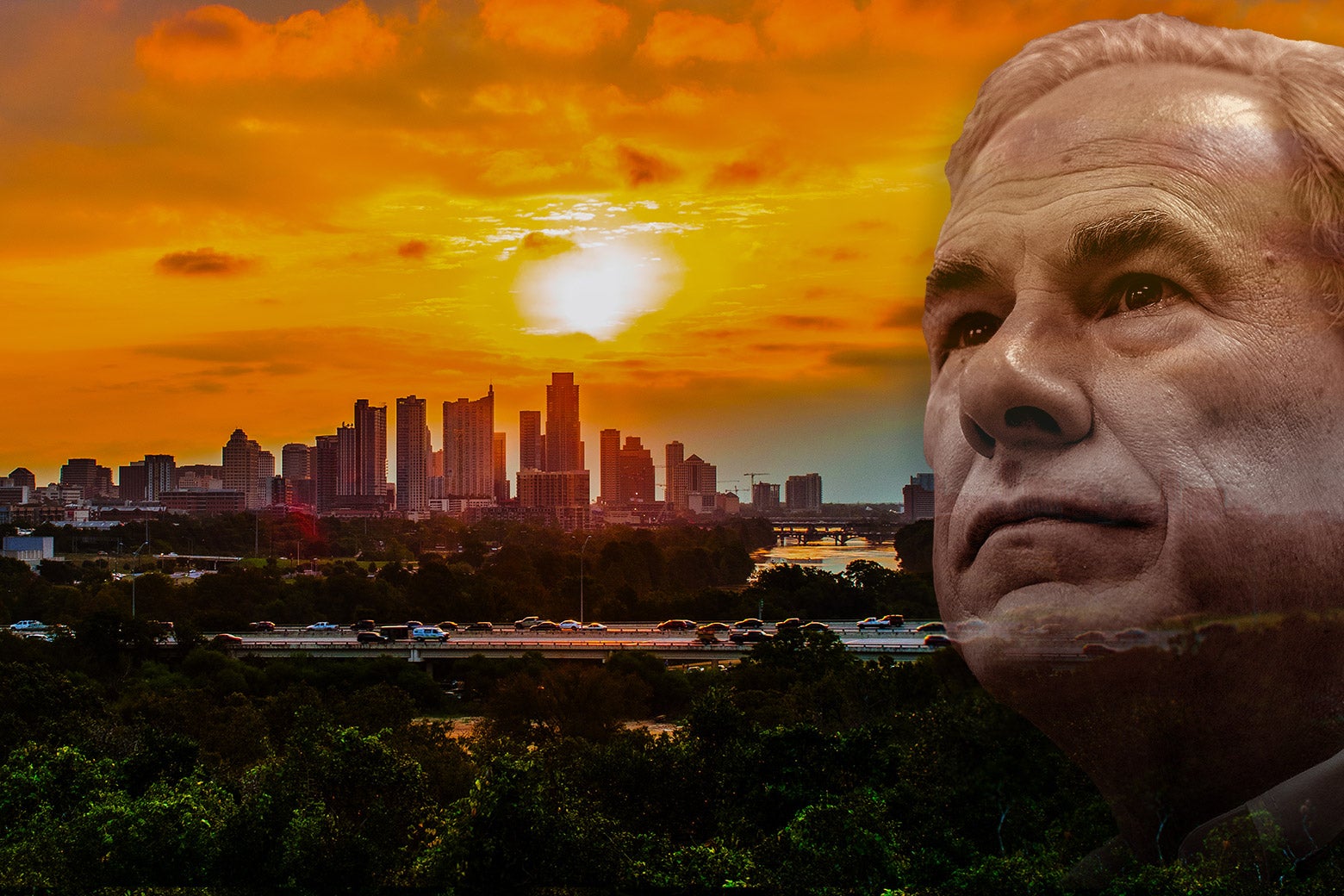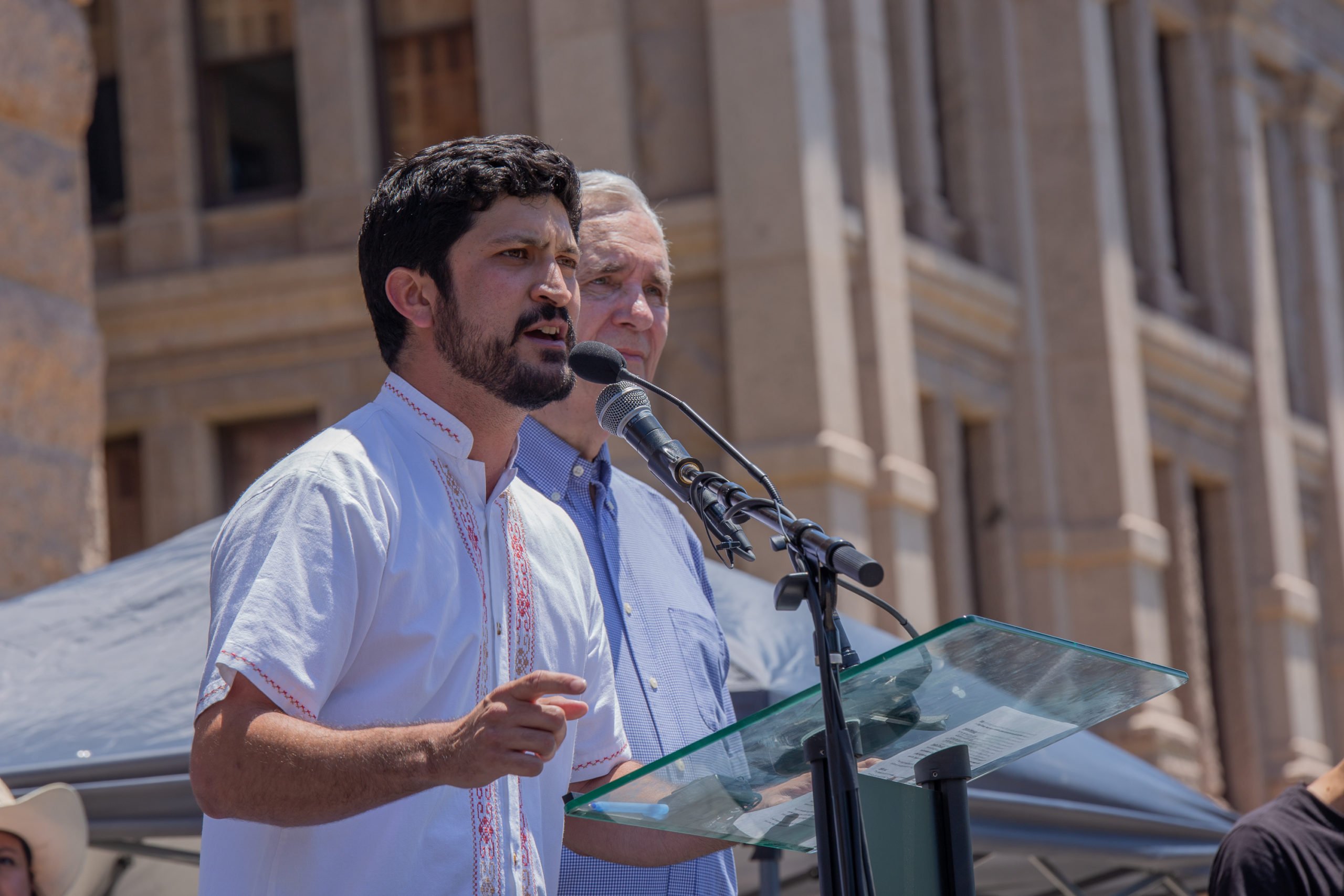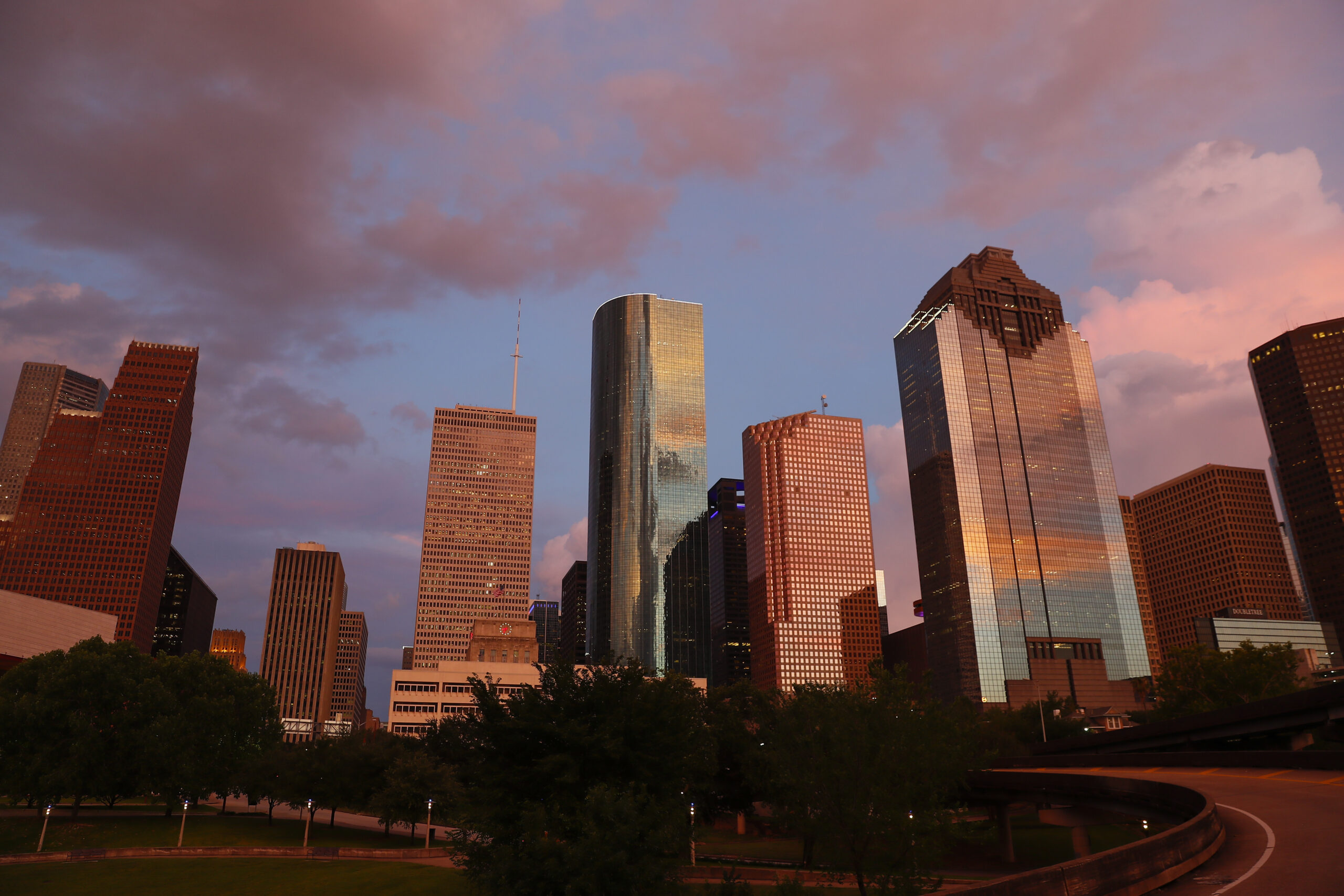“Texas Takes Attacks on Austin to New Level With 'Death Star' Law”, Aug 22, 2023, John Pfaff, Slate, at < https://slate.com/news-and-
“The ‘Death Star’ Bill Is About Kneecapping Democracy in Texas: House Bill 2127 is the culmination of a years-long fight about centralizing power, not protecting small businesses”, July 31, 2023, Gus Bova, Texas Observer, at < https://www.texasobserver.org/
Introduction by dmorista: Once again the reactionary controlled Texas Legislature leads the way for the far-right with a new law, already signed into law by the despicable Greg Abbot, and ready to go into effect on September 1, 2023. The law, written intentionally in a vague and sweeping manner is designed to severely limit the powers of local governments to address problems and issues that concern their populations. It also grants Bounty Hunter / Vigilante powers to a variety of businesses and reactionary interest groups; similar private powers were first given to right-wing activists in Texas' infamous Bounty Hunter anti-abortion law, passed in 2021. However, this law is a sweeping attack on local governments, focused of course on the various “Blue Cities” where a majority of Texas population happens to live, and where the reactionary controlled legislature's agenda is very unpopular. And it is a model for other reactionary State Legislatures to use to try to maintain control over their urban areas where the far-right is a minority of the population. The law requires that the local governments pay the legal costs for any business or interest group that successfully challenges a local law, but does not require that the businesses or interest groups pay the legal expenses of the local government should the government win the case.
In fact the Bill's Sponsor, GOP state Representative Dustin Burrows, was surreptitiously recorded saying “We hate cities and counties”. (Emphasis added) And the law includes 8 specific areas of human endeavor: “ …. vast categories of law—agriculture, business and commerce, finance, insurance, labor, natural resources, occupations, and property—in which cities may not regulate an issue that the state already regulates, unless explicitly authorized to do so somewhere in state law.”
And, quoting a longer and more complete discussion about the impact of the new law, as the article from Slate points out: “Importantly, the bill contains a provision that allows any individual or trade association to challenge any local regulation in court—and, if they prevail, requires the county or city to pay all the challenger’s costs and 'reasonable' legal fees. Those who challenge a regulation and lose have to pay those costs only if the court finds the challenge 'frivolous,' leaving the city to pay its own costs (though not those of the challenger) if it wins cases the courts see as non-frivolous. So, county and city governments assume financial risk if they attempt to defend a regulation and clarify Death Star’s reach.
“Making local governments fear litigation costs is surely a goal of Death Star’s drafters. (Emphasis added) Furthermore, targeting specific regulations in the bill one by one would have been costly and would almost surely have triggered interest-group squabbling over specifics (the bill’s surprisingly detailed focus on animal regulations suggests that this was a problem even here). And by delegating enforcement to private groups like the state’s abortion-ban bill, Death Star’s litigation-based approach also farms the cost of enforcement out to private actors to sue rather than relying on the state to act—and then forces local governments to pay when they lose.” (See, “Texas Takes Attacks on Austin to New Level With 'Death Star' Law”, Aug 22, 2023, John Pfaff, Slate)
xxxxxxxxxxxxxxx
Texas Takes Attacks on Austin to New Level With “Death Star” Law

This story was produced in partnership with the Garrison Project, an independent, nonpartisan organization addressing the crisis of mass incarceration and policing.
On Sept. 1, a bill with the pithy title “An Act Relating to State Preemption of and the Effect of Certain State or Federal Law on Certain Municipal and County Regulation” will take effect in Texas. The bill —signed into law by Gov. Greg Abbott in June—was given a much zippier name by its opponents: “Death Star,” because it could obliterate whole swaths of city and county laws and regulations.
“Basically, it’s the greatest transfer of power away from the public and into the hands of a few people in Austin that we’ve ever seen,” said Texas state Rep. John Bryant. “This handful of people that want to control our state do not want cities acting in their own interests. They do not want any city making policies that get in the way of their ideological and financial objectives.” Maybe Bryant and other Death Star critics are right—but we’ll know how big the transfer of power truly is only after everyone figures out what the bill actually says and does, and only if it survives the legal challenges several of Texas’ biggest cities have already filed against it.
The goal of Death Star is simple. The deeply conservative Texas Legislature wants to effectively deny cities—the state’s large Democratic-leaning cities, Houston, San Antonio, and Austin in particular—the ability to pass local laws and regulations in eight major policy areas: agriculture, business and commerce, finance, insurance, labor, natural resource law, occupational law, and property law. And it does all this in a bill that is 10 single-spaced pages long, nearly one page of which is legislative findings, not actual law. Which is where the problems begin.
Death Star does not aim to affirmatively lay out regulations at the state level; it simply attempts to thwart local regulations. Thus, the entirely of the provision that denies local governments the ability to regulate the insurance industry is just this: “Unless expressly authorized by another statute, a municipality or county may not adopt, enforce, or maintain an ordinance, order, or rule regulating conduct in a field of regulation that is occupied by a provision of this code. An ordinance, order, or rule that violates this section is void, unenforceable, and inconsistent with this code.” That’s it. It then repeats this language across all the various other fields, although in a few cases it adds an extra clause or two to identify specific subfields it really wants to make sure are preempted.
Problematically, as the city of Houston points out in the lawsuit it filed last month challenging Death Star as violating the Texas Constitution, these provisions lack any clarity. The new law, for example, never defines what it means for state law to “occup[y] a provision of this code” outside of the few explicit provisions noted above, making it very hard for cities to know what regulations are at risk. Houston has argued that it is unconstitutionally vague and that the Texas Constitution and state Supreme Court decisions have made this sort of “field preemption”—in which the state does not replace local law with a state alternative but simply declares whole areas ineligible for local rule making—unconstitutional under Texas law. San Antonio joined the lawsuit late last month.
The sweeping language of Death Star is likely seen more as a feature than a bug by the bill’s drafter, state Rep. Dustin Burrows, who all but brags that it is going to fall to the courts to decide what regulations are actually preempted. Importantly, the bill contains a provision that allows any individual or trade association to challenge any local regulation in court—and, if they prevail, requires the county or city to pay all the challenger’s costs and “reasonable” legal fees. Those who challenge a regulation and lose have to pay those costs only if the court finds the challenge “frivolous,” leaving the city to pay its own costs (though not those of the challenger) if it wins cases the courts see as non-frivolous. So, county and city governments assume financial risk if they attempt to defend a regulation and clarify Death Star’s reach.
Making local governments fear litigation costs is surely a goal of Death Star’s drafters. Furthermore, targeting specific regulations in the bill one by one would have been costly and would almost surely have triggered interest-group squabbling over specifics (the bill’s surprisingly detailed focus on animal regulations suggests that this was a problem even here). And by delegating enforcement to private groups like the state’s abortion-ban bill, Death Star’s litigation-based approach also farms the cost of enforcement out to private actors to sue rather than relying on the state to act—and then forces local governments to pay when they lose.
The potential for chaos is evident. The city of Houston lawsuit quotes Burrows as pointing out that in the wake of a crisis like a hurricane—when the speed and clarity of disaster response is of the essence—cities would need to petition the courts to find out what sort of emergency regulations would be permissible under the Death Star law. Burrows added that they could not expect any clarity from the Texas Legislature, which meets for only a few months every other year as it is. And assuming that Death Star survives the direct legal challenges filed against it, it will take years of litigation to hammer out its exact contours, even outside the context of emergencies. Which lays bare the pretextual nature of the drafters’ claims that the law is necessary to smooth over a “patchwork of local regulations” stymying local business.
Death Star did not arise in a vacuum. Instead, it’s perhaps the most aggressive example to date of a push by Republican-dominated state governments to thwart policymaking they dislike in their states’ generally more Democratic cities. States have historically had a significant amount of power to overrule local decision making. The U.S. Supreme Court has clearly stated that the federal Constitution provides cities no protection from states, contrary to the way it shields states from federal intervention in certain areas.
Over time, however, states saw a growing push for “home rule” laws—some, like Texas’, now enshrined in state constitutions—that undermined that presumption, and cities and counties gained more freedom to pass legislation absent explicit state laws to the contrary. The nature and strength of these rules vary from state to state and are actually fairly hard to pin down. And although states would periodically “preempt” local rules by passing overriding state laws, it was not traditionally seen as a pressing issue in state-level politics.
The past decade or so, however, has seen the rise of what Columbia Law professor Richard Briffault has dubbed “the new preemption,” in which (generally speaking) Republican state legislatures have taken increasingly aggressive aim at local regulations across a wide range of issues. The causes for this “new preemption” are likely many: the dramatic shift in state-level control by Republicans across the country starting in 2010, which gave them substantially increasing power to override more-liberal cities. The ongoing “Big Sort,” which has seen a rise in geographic clustering by ideology (with urban areas becoming more Democratic and rural ones more Republican). A Republican Party that increasingly seems to see thwarting liberal goals as a policy goal in and of itself.
What makes Death Star particularly noteworthy is not so much its aggressive attempts to preempt local rules as the sheer breadth of the effort. Tellingly, this is the second “Death Star” bill to be enacted in the past decade, but the narrow focus of the earlier bill—passed in Michigan in 2015 and targeting only some local employment regulations—makes that one look like a TIE fighter in comparison. Republican states have already been steadily eroding local autonomy all across the country, but they usually stick to one or two issues at a time (like the way Texas, among other states, curtailed cities’ ability to reduce police budgets in the wake of nationwide racial justice protests following the murder of George Floyd). If the Texas Legislature is successful here—or fails for very Texas law–specific reasons—we should expect more Republican state legislatures to start passing sweeping bills like this.
At least in Texas, however, cities have some hope of courts pushing back thanks to fairly strong home rule laws, which are rooted at least in part in the state’s historical distrust of strong government power. These home rule protections cannot hold off the state from chiseling away at local autonomy, but they may be enough to block all-encompassing bills like Death Star. And smaller efforts take more time and are politically costlier. But home rule protections vary widely across states, and cities in many places have far fewer protections than those in Texas.
In 2019, Burrows, Death Star’s author, was caught on a surreptitious recording saying “We hate cities and counties.” That attitude is not unique to Texas Republicans, and even if Death Star does not survive legal challenges, it likely represents the start of a new chapter of even more sweeping, aggressive efforts by state Republican officials to roll back local rules in Democratic cities that they simply do not like.
xxxxxxxxxxxxxxxxxxxxxxxx
The ‘Death Star’ Bill Is About Kneecapping Democracy in Texas

House Bill 2127 is the culmination of a years-long fight about centralizing power, not protecting small businesses.

On November 3, 2020, as America watched the first results of a fateful presidential contest roll in, voters in a North Texas suburb struck a blow for workers’ rights. Euless residents approved a proposition limiting some large companies’ ability to force employees to work overtime if they didn’t want to.
The “fair workweek” initiative, comparable to measures passed recently in a handful of other cities, was led in Euless by employees of LSG Sky Chefs, an airline catering giant and meal-supplier for American Airlines. These workers, unionized with Unite Here, said they were being overwhelmed with mandatory overtime hours, often announced at the last minute, as American Airlines, headquartered near the sprawling Dallas-Fort Worth airport, sought to dramatically increase flight volume.
“You can have a wife and children, and yet every day you are forced to stay at work, and you have no time to even go back and sit and relax and play and take care of children,” said Samuel Tandankwa, a Sky Chefs driver and Unite Here member, recalling the conditions in 2019 and leading up to the COVID pandemic.
Despite getting voters’ approval, the initiative faced legal troubles from the first. Some city officials doubted it could be enforced. Sky Chefs told the Texas Observer it didn’t apply to them since they maintain a national contract with Unite Here. And Texas Attorney General Ken Paxton had already written a letter stating the policy would violate a state law that bans cities from setting minimum wages. Nevertheless, Tandankwa told the Observer in July that since the campaign, the company actually has turned away from using mandatory overtime, freeing up workers to meet family obligations, and neither he nor local worker advocates want to lose the ordinance.
But Euless’ overtime measure is among the local ordinances that will be vaporized by Texas’ House Bill 2127, dubbed the “Death Star” bill by critics, which was signed by GOP Governor Greg Abbott last month and takes effect in September. It’s causing uproar around the state, as city officials, workers, and others try to figure out what parts of municipal law and regulation the bill will nullify.
The legislation’s real intent is both narrower and potentially more profound than just upending city ordinance-making powers.
The bill’s sweeping, alleged purpose is stated in its opening sections: “returning sovereign regulatory powers to the state where those powers belong.” However, closer examination suggests that the legislation’s real intent is both narrower and potentially more profound than just upending city ordinance-making powers. First, it is a laser beam aimed at a small group of progressive ordinances improving worker and tenant protections—local victories won through hard-fought campaigns over the course of more than a decade. Second, and more importantly, it’s a bid to permanently hamstring municipal democracy in Texas, especially in its big blue cities. Cities are where most Texans live; they are increasingly liberal, their populations often majority nonwhite, and they are the level of government most responsive to ordinary citizens. In essence, the Legislature decided there was too much Democracy afoot in Texas, so it did something about it.
“To me, that’s the will of the people being taken away,” said Tevita Uhatafe, a Euless resident who works for American Airlines and is also a vice president of the Texas AFL-CIO. “We voted for it … and here we are, we’re going to get it taken away because people who claim to hate big government are acting just like [it].”
“There is no precedent for what they did this time,” said Rick Levy, president of the Texas AFL-CIO. “It was not a measured response to a given policy that corporate interests didn’t like; it was a wholesale transfer of power from cities to politicians in Austin.”
HB 2127 is mostly broad in its language—and thus unclear in what all it actually will do. It lists vast categories of law—agriculture, business and commerce, finance, insurance, labor, natural resources, occupations, and property—in which cities may not regulate an issue that the state already regulates, unless explicitly authorized to do so somewhere in state law.
Some cities and legal experts argue that would return populous cities to the very limited level of power they had in Texas until the early 1900s. Growing cities were burdening the Legislature with so many local concerns that the Lege put an issue on the ballot that, in essence, allowed cities with more than 5,000 people to self-govern—a capacity known as “home rule.” Voters passed the amendment in 1912. Cities could now legislate broadly, as long as their ordinances didn’t contradict state law. The City of Houston has already filed suit to block the Death Star bill, charging that undoing home rule would require another voter-approved constitutional amendment.
The full extent of what local policies the bill will undo is unclear, say city attorneys. “People ask me often … ‘Are we combing through our ordinances?’ And the answer to that is ‘No,’” San Antonio City Attorney Andy Segovia told the Observer. Because of the bill’s vague wording, he said, “It would be almost an impossible task to identify those [ordinances] that we would have a high degree of confidence would be affected.”
However, the Legislature was specific in attacking local labor and tenant protections along with a couple other grab-bag issues. The bill forbids local ordinances on overtime and other work scheduling matters, policies mandating rest breaks for construction workers like those maintained in Dallas and Austin, and also “fair chance hiring” policies like those on the books in Austin and DeSoto, which help the formerly incarcerated get jobs. It forbids eviction protections like those in Austin and Dallas, too. Another provision appears to target Austin’s ban on cat declawing, while convoluted carve-outs grandfather in existing local regulations of payday lenders and so-called puppy mills while preempting future measures.
Bills to wipe out local regulation of employment practices were pushed by the state’s powerful business lobby in the 2019 and 2021 legislative sessions but didn’t pass. The core language of those bills was inserted into the Death Star bill.

City attorneys told the Observer they could not provide a list of affected ordinances and would ultimately need clarity from the courts. Taking a page from the state’s bounty hunter-style abortion ban, HB 2127 expressly authorizes individuals and trade associations to sue cities or counties for violations. A judge may order a city to abandon its policy but can only award the plaintiff costs and fees, so some cities may simply wait for these suits to arrive before making decisions.
HB 2127 is just the latest entry in a saga of state “preemption,” the term referring to a higher level of government big-footing a lower level. Over the last decade, the Legislature has undone local efforts to regulate fracking and ridesharing companies, to reduce police budgets and decriminalize homelessness, to prohibit discrimination against Section 8 tenants and reduce deportations from jails, while also capping local tax revenues. Between 2018 and 2019, Austin, San Antonio, and Dallas also passed policies requiring employers to provide paid sick leave. These ordinances were thoroughly stymied by the courts, but the business lobby—exemplified by the National Federation of Independent Business and the Texas Public Policy Foundation—went on the warpath against local labor protections anyway.
U.S. Representative Greg Casar, a Democrat representing a swath of Texas from Austin to San Antonio, led the charge as an Austin City Council member from 2015 to 2022 when the capital city pushed the bounds of local progressive policymaking further than any other city in the state and likely across the South. He sees a continuous thread in the state’s pushback from then to now.
“Big corporate lobbies do not want our democracy to work for working people,” Casar told the Observer. “And they don’t want any examples that can show that democracy can work for working people.”
GOP state Representative Dustin Burrows, author of the Death Star bill, minces no words in describing his feelings about local government. “We hate cities and counties,” he said in 2019, a comment caught on a surreptitious recording. However, his explanation of HB 2127’s provisions was much less clear.
It’s needed, he said at one point, because small businesses just can’t navigate a “patchwork of local regulations”—although business-related local policies have often exempted companies below a certain threshold. He said the bill would actually help local officials by giving them an excuse not to vote on “countless issues that activists have been harassing them to pass.” In committee, he said the bill would encourage the Legislature to “do a better job of regulating … industry”—a claim that would surely elicit a bitter chuckle from any seasoned watcher of Texas politics. Throughout, Burrows stated that cities would retain control over core functions like zoning and public safety. On the other hand, he also specifically promised that cities could still regulate billboards—and the billboard industry is already scheming openly to the contrary.
Perhaps his most accurate explanation about the bill—and his vision of democracy—came when he complained at a hearing that “Some of the same advocates that come to the Legislature with their agenda that are not able to get it through here at the state Capitol have now gone to some of our cities” and gotten them to adopt measures “to implement their vision of Texas in a way that we have already rejected.”
The bill’s Senate sponsor, Republican Brandon Creighton, at one point defended HB 2127 with the inspiring phrase: “We write statute that’s ambiguous on purpose and vague.” And then he slipped into it a provision banning local governments from passing measures to give renters some protection from eviction, while utterly misdescribing what he was doing.
Levy, the state AFL-CIO president, worries that the Death Star law’s strange structure will allow lobbyists to slip seemingly innocuous provisions into bills simply to create state “regulation” in a policy area for the purpose of later undoing local policies in court.
“It sets up the state Legislature as the place where lobbyists can go to play to get anything they don’t like on the local level invalidated,” Levy said. Such lobbyists, of course, represent the very same organizations that are empowered to sue cities or counties for violations of the new law—a process whereby, as the City of Houston has put it, cities and taxpayers will end up funding “lawsuits filed by trade associations seeking to deregulate their industries at the local level.”
In its lawsuit seeking to block HB 2127, Houston argues that the bill will “effectively repeal” the state’s century-old home rule regime—which cannot legally be done through an ordinary bill but would require a constitutional amendment approved by the people. “The State of Texas is not its state legislature alone,” the suit says. “Instead, Texas’ sovereign powers are vested in Texans themselves and, in their Constitution, Texans delegated [home rule] powers to cities.”
As of July 24, the state has yet to file an answer to the lawsuit, though Burrows made sure to note on Twitter that the Bayou City had enlisted the help of an attorney based in California. San Antonio has joined the suit against the state as well.
Declaring war on home rule is a recent phenomenon concentrated in states like Texas, Florida, and Arizona that have both right-wing legislatures and large urban areas. “The general movement from the late 19th century to the late 20th or early 21st century [was] in the opposite direction: to increase respect for local self-government,” said Richard Briffault, a scholar of preemption at Columbia Law School. “But what you have been seeing in the last, I’d say, 15 years is a big pushback on that, and a lot of it correlates with [the urban-rural divide]—a lot of it correlates with party, and a lot of it correlates with race.”

That timeline corresponds with the Republican takeover of many state legislatures, while many cities (such as Houston) grew ever-bluer. The Death Star bill specifically forms part of a more recent trend of so-called super preemption, meaning measures that target city powers broadly, but experts say Texas’ law is novel in its scope. “In the breadth of it, in how open-ended it is, in the ways in which it really does seem to try to completely reorder the relationship between cities and the state, I do think it’s something new,” said Nestor Davidson, another scholar of state-city conflict at Fordham University.
“If you look at the role that cities play today in terms of being the level of government closest to the people,” Davidson said, “if they don’t have the authority they need to be able to respond … I do think ultimately that that’s a democracy issue.”
Darwin Hamilton recalls clearly the late night at Austin City Hall in 2016 when his city became the first in the South to pass a fair-chance hiring policy, which forbids private employers from initially asking about applicants’ criminal backgrounds. An advocate on criminal justice issues who was formerly incarcerated himself, he still remembers how the crowd erupted. “It was just a monumental and historic night,” Hamilton told the Observer. “Given who our opposition was … attorneys, well-funded, from [the Texas Public Policy Foundation] and staffing companies, Chamber of Commerce—and then here are these formerly incarcerated people who basically won the debate that night.”
He and his allies spent the next few years fighting state legislation to undo the victory—successfully, until the Death Star arrived.
A statewide but much more limited version of the fair chance hiring policy, applying to public employers only, died at the Capitol this year, along with measures mandating rest breaks and various other versions of pro-worker and pro-tenant policies over the years. Assuming Houston’s lawsuit does not succeed, progressive activists will have to recalibrate their strategies post-HB 2127.
“[HB 2127] doesn’t necessarily mean that there still can’t be a lot of really innovative and amazing things that happen at the local level,” said Kara Sheehan of the nonprofit Local Progress. She pointed to San Antonio, which rather than giving up entirely on a proposed policy mandating rest breaks for construction workers is now scaling it back to apply only to employers contracted or funded by the city. A measure along those lines should survive the Death Star.
“I think that it’s going to be just more fuel for this kind of current wave of unionization.”
More ambitiously, private-sector union drives can lead to collective bargaining agreements containing requirements comparable to those that cities can no longer impose. Levy suggested HB 2127 is “telling workers … ‘You’re on your own, you better organize,’ and I think that it’s going to be just more fuel for this kind of current wave of unionization” that’s playing out in workplaces from hospitals to newspapers to coffee shops.
Last, there’s always the level of government to which even Texas must defer. As a historically hot summer bakes the Southwest, Casar, the councilman-turned-congressman, is pushing the federal Occupational Safety and Health Administration to accelerate its ongoing process of promulgating a heat safety standard, which could mandate rest breaks for construction workers and other laborers nationwide for the first time.
“Mourn, and then organize,” Casar advised. “I and lots of other organizers and elected officials put our lives into [measures undone by the Legislature], but this is what the right wing in power in the state does. … What they were able to do is pass a law to try to snuff out policies—but I don’t think they can snuff out that local democracy. I think that only happens if we let them.”
Gus Bova is a senior staff writer and assistant editor at the Texas Observer. He covers labor, politics, and other major Texas stories. He has written extensively on topics ranging from the border wall to homelessness. Before coming to the Observer, he worked at a shelter for recently arrived immigrants and asylum-seekers. He studied Latin American Studies at the University of Kansas.
No comments:
Post a Comment